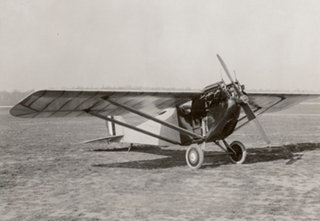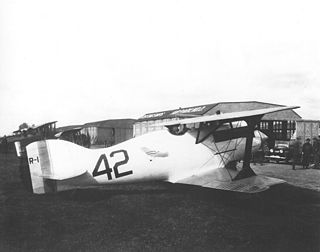| Loening R-4 | |
|---|---|
 | |
| Loening R-4 in 1922 | |
| Role | Racing |
| National origin | United States |
| Manufacturer | Loening |
| First flight | 10 January 1922 |
| Primary user | US Army Air Service |
| Number built | 2 |
The Loening R-4 was a racer aircraft built by Loening in the early 1920s.
| Loening R-4 | |
|---|---|
 | |
| Loening R-4 in 1922 | |
| Role | Racing |
| National origin | United States |
| Manufacturer | Loening |
| First flight | 10 January 1922 |
| Primary user | US Army Air Service |
| Number built | 2 |
The Loening R-4 was a racer aircraft built by Loening in the early 1920s.
The R-4 featured a low-wing monoplane layout, and the Packard engine weighed three times the size of the aircraft and took up a quarter length of the R-4, nicknamed the "flying engine". Both R-4 racers (AS68559 and AS68560) were entered in the 1922 Pulitzer Trophy race with poor results, being reported as "almost total flops".
Data from , [1] Airwar : Loening R-4 [2]
General characteristics
Performance

The Keystone–Loening K-84 Commuter was a single-engine closed-cabin 4-place biplane amphibious flying boat built by Keystone–Loening. It was powered by a 300 hp Wright Whirlwind engine mounted between the wings with the propeller just ahead of the windscreen. It was first produced in 1929.

The Loening OL, also known as the Loening Amphibian, was an American two-seat amphibious biplane designed by Grover Loening and built by Loening for the United States Army Air Corps and the United States Navy.

The Loening M-8 was a 1910s American fighter monoplane designed by Grover Loening and built by his Loening Aeronautical Engineering Company. An order of 5000 for the United States Army Air Corps was canceled when the First World War ended.

The Loening PW-2 was a 1920s American single-seat monoplane fighter designed by Grover Loening and built by his Loening Aeronautical Engineering Company.

The Loening S-1 Flying Yacht, also called the Loening Model 23, was an early light monoplane flying boat designed in the United States by Grover Loening in the early 1920s. The aircraft won the 1921 Collier Trophy.

The Boeing XPB was an American twin-engined biplane long-range patrol flying boat of the 1920s. A single example was built for the United States Navy.

The Loening SL was an American submarine-based reconnaissance flying boat designed and built by Loening Aeronautical Engineering for the United States Navy.

The Verville-Packard R-1 Racer was a military racing aircraft that was modified from Alfred V. Verville's previous Verville VCP-1 design. The R-1 is sometimes known also as the Verville-Packard VCP-R or the Verville-Packard 600. The R-1 was the first racing aircraft built for the United States Army Air Corps.
The Grigorovich E-2, or DG-55, was a two-seat, twin-engined, low-wing, prototype sport aircraft of Soviet origin.

The Caproni Ca.87 was an Italian flying boat built in the 1920s for a planned transatlantic flight.
The CANT Z.504 was a prototype reconnaissance biplane flying boat made by CANT in the 1930s.

The CANT Z.505 was a prototype trimotor transport floatplane built by CANT in the 1930s.
The Caproni Ca.146 was a high-wing reconnaissance aircraft built by Caproni in the mid-1930s.

The Loening C-1 Air Yacht was an amphibious airliner produced in the United States at the end of the 1920s.
The Loening C-5 was an American amphibious aircraft built by Loening in the 1930s.

The Caspar C 27 was a training seaplane aircraft developed in Germany in the late 1920s.
The Caspar C 33 was a training aircraft developed in Germany in the late 1920s.
The Caspar CT 1 was a sports aircraft developed in Germany in the early 1920s.
The Caudron C.360 was a French racing aircraft built by Caudron in the early 1930s to compete in Coupe Deutsch de la Meurthe air races.
The IMAM Ro.26, sometimes called the Romeo Ro.26, was a single-engine biplane trainer aircraft produced by the Italian aeronautical company IMAM in the early 1930s. Only one example was built.